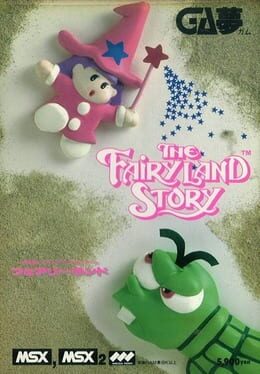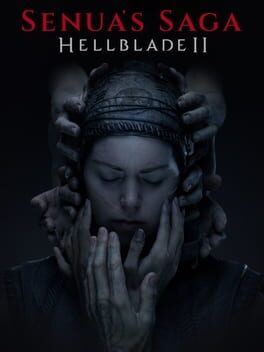ArcaneCrystal
Recent Activity
jtduckman
completed
Pressure Cooker
13 mins ago
1 hr ago
alivedovedoeat
completed
Alcatraz: A Fuga Impossível
That the game begins not with a vision of confinement, visual limits, but with a vision of your prisoner standing against the pale blue of a clear sky is not just an encouraging glimpse of the freedom which eventually awaits you. It's a statement that freedom simply can't exist without structure: one builds one's prison in the process of escaping it, filling more and more of the screen with it until, at the moment of departure, Alcatraz is finally made whole. It's as much a loving tribute to the maze which defined both tabletop and digital games in its time as it is a prescient refutation of the open-world structure which would replace it, a triumph of Apollonian design already pregnant with melancholy as it looks to the long Dionysian night to follow.
In order to better understand the themes of A Fuga Impossível, I think I'd like to take a brief digression to talk about the 2024 Bezos-disfavored visual novel Malcatras' Maiden, which uses these ideas of freedom and structure in a more historicized way, with a greater consciousness of their status as kitsch objects.
The historian Stephanie Larson's argued that Sappho's Fragment 94 is structured to draw parallels between the narrator's feelings for her departing lover and those of Penelope in the Odyssey, to present this affair not as the emphemeral pre-marital love her audience would have understood this kind of relationship to constitute, but as something mythic. This is a reasonable guess; she does something comparable in Fragment 16 by direct analogy to Helen and Paris, but I'm not certain that it matters very much. The content of Sappho's work doesn't seem to have interested the Greeks nearly as much as her composition, and it's difficult to blame them: Fragment 94, when it's rendered faithfully into English by Anne Carson, is a really dull poem. As I see it, the mythologization of intrafeminine sex begins with the Victorians, and that Sappho's role in that mythology has less to do with her own work than the poetry of Swinburne and the illustrations of Simeon Solomon. When we consider that Solomon and Swinburne had both contributed to The Dark Blue, a literary magazine whose only lasting contribution to history is having published Carmilla, it becomes a lot easier to accept that Carmilla is, more than the first vampire novel, probably the first major lesbian novel.
Malcatras' Maiden signals that it's influenced by Carmilla by naming one of its characters for the pseudonym Carmilla adopts during her seduction of the General's ward. The reference seemed tacky at first, especially given the game's frontloading of its most generic and self-indulgent qualities, but it's ultimately earned. Nova appreciates and is able to effectively appropriate the best aspects of that novella: the heady Gothic overstatement of desire and restraint, and the presentation of love as something which makes communication impossible. At its best, when it lets these qualities take over, it's a really worthy piece of exploitation, approached with a kind of genuine investment that makes the prose and the blood-and-nightgown aesthetics feel more fresh and vital than they have any right to.
The game's doesn't really have anything to say about the family, and certainly can't approach incest as a serious theme, but it's able to integrate it into its own internal mythic structure. The game's at its best when it confines itself to that mythology, which is why I was so disappointed by shift into prosaic language and extended JoJo's fights in the last act. The final few minutes of the penultimate chapter are satisfyingly camp, as is the brief epilogue, but the ending's kind of unsatisfying. A story about a character failing to grow might be satisfying in a game that relies less on maximalism and more psychological realism, but this one demanded that the friction between her programmatic and the animal qualities should come to something.
As ever, having a transgender character's prevailing quality be helplessness kind of rankles, but the genre in which it's working does something to warrant it. At the very least, it's worth it for what I interpreted to be a very good joke about Fuseli's The Nightmare. Fantastic soundtrack and animation for a work on this scale.
In order to better understand the themes of A Fuga Impossível, I think I'd like to take a brief digression to talk about the 2024 Bezos-disfavored visual novel Malcatras' Maiden, which uses these ideas of freedom and structure in a more historicized way, with a greater consciousness of their status as kitsch objects.
The historian Stephanie Larson's argued that Sappho's Fragment 94 is structured to draw parallels between the narrator's feelings for her departing lover and those of Penelope in the Odyssey, to present this affair not as the emphemeral pre-marital love her audience would have understood this kind of relationship to constitute, but as something mythic. This is a reasonable guess; she does something comparable in Fragment 16 by direct analogy to Helen and Paris, but I'm not certain that it matters very much. The content of Sappho's work doesn't seem to have interested the Greeks nearly as much as her composition, and it's difficult to blame them: Fragment 94, when it's rendered faithfully into English by Anne Carson, is a really dull poem. As I see it, the mythologization of intrafeminine sex begins with the Victorians, and that Sappho's role in that mythology has less to do with her own work than the poetry of Swinburne and the illustrations of Simeon Solomon. When we consider that Solomon and Swinburne had both contributed to The Dark Blue, a literary magazine whose only lasting contribution to history is having published Carmilla, it becomes a lot easier to accept that Carmilla is, more than the first vampire novel, probably the first major lesbian novel.
Malcatras' Maiden signals that it's influenced by Carmilla by naming one of its characters for the pseudonym Carmilla adopts during her seduction of the General's ward. The reference seemed tacky at first, especially given the game's frontloading of its most generic and self-indulgent qualities, but it's ultimately earned. Nova appreciates and is able to effectively appropriate the best aspects of that novella: the heady Gothic overstatement of desire and restraint, and the presentation of love as something which makes communication impossible. At its best, when it lets these qualities take over, it's a really worthy piece of exploitation, approached with a kind of genuine investment that makes the prose and the blood-and-nightgown aesthetics feel more fresh and vital than they have any right to.
The game's doesn't really have anything to say about the family, and certainly can't approach incest as a serious theme, but it's able to integrate it into its own internal mythic structure. The game's at its best when it confines itself to that mythology, which is why I was so disappointed by shift into prosaic language and extended JoJo's fights in the last act. The final few minutes of the penultimate chapter are satisfyingly camp, as is the brief epilogue, but the ending's kind of unsatisfying. A story about a character failing to grow might be satisfying in a game that relies less on maximalism and more psychological realism, but this one demanded that the friction between her programmatic and the animal qualities should come to something.
As ever, having a transgender character's prevailing quality be helplessness kind of rankles, but the genre in which it's working does something to warrant it. At the very least, it's worth it for what I interpreted to be a very good joke about Fuseli's The Nightmare. Fantastic soundtrack and animation for a work on this scale.
1 hr ago
chump
completed
Bramble: The Mountain King
3 hrs ago
chump
completed
Smile For Me
3 hrs ago
3 hrs ago
jtduckman
finished
The Fairyland Story
bro we could have had a cute witch girl as the taito mascot before she got replaced by two doofy-looking dinosaurs?!?!? I love bub and bob as much as the next guy but we've been robbed here
The game itself is a charming lil single-screen arcade game. Definitely more puzzle-platformy than the action-platformy type beats that bubble bobble would go on to have. Instead of directly attacking enemies, you turn them into cakes and can only defeat enemies by either pushing their cake form off an edge or by blasting them several times while they are still in cake form. The latter half of the game gets especially difficult as there are tons of trick levels where if you go about blasting things willy-nilly you can and WILL get yourself stuck until the hurry-up-or-you-die enemy shows up and kills you, and that's a way worse way to go than just dying outright. The game likes to play with its own very strange-yet-consistent hitboxes and jump arcs so you can definitely take advantage of cheesing levels by shooting through walls and floors you probably aren't supposed to. There are 101 stages which makes the game kind of an endurance test, and the game DOES pull some bullshit by letting you continue on any level except the last 3 so if you want to actually clear this either get ready to memorize the proper way to clear each level or just use save states like the rest of our sane modern society. The level design is pretty hit-or-miss but dangit i liked the vibes so I can't say it was all bad. bring ptolemy back taito you COWARDS
The game itself is a charming lil single-screen arcade game. Definitely more puzzle-platformy than the action-platformy type beats that bubble bobble would go on to have. Instead of directly attacking enemies, you turn them into cakes and can only defeat enemies by either pushing their cake form off an edge or by blasting them several times while they are still in cake form. The latter half of the game gets especially difficult as there are tons of trick levels where if you go about blasting things willy-nilly you can and WILL get yourself stuck until the hurry-up-or-you-die enemy shows up and kills you, and that's a way worse way to go than just dying outright. The game likes to play with its own very strange-yet-consistent hitboxes and jump arcs so you can definitely take advantage of cheesing levels by shooting through walls and floors you probably aren't supposed to. There are 101 stages which makes the game kind of an endurance test, and the game DOES pull some bullshit by letting you continue on any level except the last 3 so if you want to actually clear this either get ready to memorize the proper way to clear each level or just use save states like the rest of our sane modern society. The level design is pretty hit-or-miss but dangit i liked the vibes so I can't say it was all bad. bring ptolemy back taito you COWARDS
5 hrs ago
jtduckman
completed
The Fairyland Story
5 hrs ago
poyfuh
completed
The World to Reverse.
1 day ago
chump
finished
Resident Evil 2
Broadly speaking, challenge design in video games tends to revolve around one of two concepts, let's call them "newness" and "oldness." We can represent these two schools with opposite ends of the spectrum: an entirely contextual puzzler like Myst, where your ability to progress is synonymous with your ability to synthesize unfamiliar information, and a single-screen arcade game like Tetris, in which every possible mechanical outcome is immediately apparent and instead it's on the player to react to a rapidly changing state. Though these are extreme examples, as a general rule newness-focused games are less enjoyable when they become old, and oldness-focused games are less enjoyable while they're still new. Unless you manage to wipe your memory, there's not much to get out of Myst on a second run, and, conversely, the foremost tenant of traditional game design is to limit newness as much as possible- Tetris's extraordinary staying power is thanks to it accomplishing this more effectively than any of its peers. Resident Evil is unique in that it's disjointedly designed to harness both newness and oldness: your first playthrough centers around figuring out your goal, hunting for supplies, and traversing the unknown, and everything that follows sees you using your preexisting knowledge of Spencer Mansion's layout to route through it as efficiently as possible. Functionally, that's why there's two protagonists with slightly diverging paths, so a higher percentage of players will complete the game more than once and thus experience both sides of the medallion. It's also why the remake's addition of crimson heads is downright transformative. At first, they're another layer of obstacles that takes you by surprise, even if you've played the original game, and, on revisit, the sense of paranoia that they induce becomes a major wrinkle in how you approach the game's opening hours. Crimson heads are spooky when you don't know they're coming, and they're still spooky when you know they're coming, which best sums up the game's two-way design philosophy. What makes Resident Evil special even among other games that attempt something similar (Super Metroid and Dark Souls come to mind) is that, outside of getting used to its tank controls, there's pretty much no motor skill required. Cover to cover, it's entirely a brain game, and, at its best, it can feel like a constantly shifting set of puzzles and solutions.
I've never much cared for the original Resident Evil 2, mostly because of how it upsets the balance between newness and oldness. My theory is that Kamiya & co. didn't think they could pull off both without feeling derivative of the first game, and instead decided to focus primarily on the new. The RPD HQ is gorgeous but its long, looping hallways make it so there's usually a "correct" path to take at all times, and it's still by far the most well designed of the three locations you visit. Weapon upgrades, puzzle boss fights, and that one window shutter mechanism are all neat but don't feel like they add much to the experience on a deeper level, and the addition of a dedicated "B" campaign means that the newness continues into a replay- let's not forget that Tyrant originally doesn’t show up until your second run. With twenty years of available technological improvements, I fully expected 2's remake to pile on the newness even further, and ink ribbons not being present in the intended difficulty (which is kind of absurd in its own right) was an early sign that I might’ve been correct. But, surprisingly, I enjoyed my second run much more than my first. Part of this is because the added newness often misses- some cool puzzle elements are overshadowed by too many predictably cinematic moments, and everything that happens while transitioning between locations is pretty awful. The boring Ada & Sherry sections, that bizarre crocodile chase that feels straight out of RE4 (in a bad way), having to dodge G’s claws for like five minutes before getting to fight him in the sewers, and that melodramatic “my daughter’s a zombie” cutscene that feels straight out of The Last of Us- getting reminded that people care about, like, the overarching story of Resident Evil always gives me a bit of whiplash. Despite the sewers being significantly streamlined from the original, this stuff breaks up the flow even more egregiously because of how smoothly things were going directly beforehand. But, for me, the game’s lowest point came when I was killed by a licker for the first time and was immediately greeted with a loading screen tip that told me to walk slowly, which canceled out any potential newness that lickers might’ve offered and ensured that I was virtually never bothered by one ever again. That is, until I ran into a licker while I was being chased by Tyrant- forcing you into a situation where you have to modulate your movement speed is a good example of how the game eventually starts to shine. While I prefer the precise, robotic nature of the earlier games’ tank controls, RE2’s remake embraces the scramble. Planning and strategizing, here, are less fun than going in gung-ho, kneecapping zombies on reflex, and picking up items out of desperation rather than out of foresight. It feels like a full realization of the original game’s more action-focused dreams that weren’t attenable in ‘98: being able to damage individual body parts, enemies that are free to move into adjacent rooms, and having to listen for groans and footsteps while running for your life all make for an intense, fast-paced siege and help to alleviate the more linear level design even if they don’t totally make up for it. Does it come close to either version of RE1 for me? No. But it’s a damn good entry in the series. And, most importantly, it transformed a game I never clicked with into one that I ended up enjoying. If that doesn’t qualify it as a great remake, then nothing ever could.
I've never much cared for the original Resident Evil 2, mostly because of how it upsets the balance between newness and oldness. My theory is that Kamiya & co. didn't think they could pull off both without feeling derivative of the first game, and instead decided to focus primarily on the new. The RPD HQ is gorgeous but its long, looping hallways make it so there's usually a "correct" path to take at all times, and it's still by far the most well designed of the three locations you visit. Weapon upgrades, puzzle boss fights, and that one window shutter mechanism are all neat but don't feel like they add much to the experience on a deeper level, and the addition of a dedicated "B" campaign means that the newness continues into a replay- let's not forget that Tyrant originally doesn’t show up until your second run. With twenty years of available technological improvements, I fully expected 2's remake to pile on the newness even further, and ink ribbons not being present in the intended difficulty (which is kind of absurd in its own right) was an early sign that I might’ve been correct. But, surprisingly, I enjoyed my second run much more than my first. Part of this is because the added newness often misses- some cool puzzle elements are overshadowed by too many predictably cinematic moments, and everything that happens while transitioning between locations is pretty awful. The boring Ada & Sherry sections, that bizarre crocodile chase that feels straight out of RE4 (in a bad way), having to dodge G’s claws for like five minutes before getting to fight him in the sewers, and that melodramatic “my daughter’s a zombie” cutscene that feels straight out of The Last of Us- getting reminded that people care about, like, the overarching story of Resident Evil always gives me a bit of whiplash. Despite the sewers being significantly streamlined from the original, this stuff breaks up the flow even more egregiously because of how smoothly things were going directly beforehand. But, for me, the game’s lowest point came when I was killed by a licker for the first time and was immediately greeted with a loading screen tip that told me to walk slowly, which canceled out any potential newness that lickers might’ve offered and ensured that I was virtually never bothered by one ever again. That is, until I ran into a licker while I was being chased by Tyrant- forcing you into a situation where you have to modulate your movement speed is a good example of how the game eventually starts to shine. While I prefer the precise, robotic nature of the earlier games’ tank controls, RE2’s remake embraces the scramble. Planning and strategizing, here, are less fun than going in gung-ho, kneecapping zombies on reflex, and picking up items out of desperation rather than out of foresight. It feels like a full realization of the original game’s more action-focused dreams that weren’t attenable in ‘98: being able to damage individual body parts, enemies that are free to move into adjacent rooms, and having to listen for groans and footsteps while running for your life all make for an intense, fast-paced siege and help to alleviate the more linear level design even if they don’t totally make up for it. Does it come close to either version of RE1 for me? No. But it’s a damn good entry in the series. And, most importantly, it transformed a game I never clicked with into one that I ended up enjoying. If that doesn’t qualify it as a great remake, then nothing ever could.
1 day ago
poyfuh
finished
Fate/Extra
1 day ago
jbu3
finished
Senua's Saga: Hellblade II
This would be one star if it weren't for an impressive horror sequence halfway through.
It's certainly a pretty game, but looks don't mean anything if they get in the way of playing the damned thing. It's so insistent on maintaining its cinematic approach that there are no button prompts, no feedback on what you're pressing. It's a game where the block button is more of a suggestion than a command!
Choices equally baffling and infuriating dogged us throughout our playthrough, leading up to an underwhelming ending. If there's ever a Hellblade III, let's hope Senua finds a better saga.
It's certainly a pretty game, but looks don't mean anything if they get in the way of playing the damned thing. It's so insistent on maintaining its cinematic approach that there are no button prompts, no feedback on what you're pressing. It's a game where the block button is more of a suggestion than a command!
Choices equally baffling and infuriating dogged us throughout our playthrough, leading up to an underwhelming ending. If there's ever a Hellblade III, let's hope Senua finds a better saga.
1 day ago
jtduckman is
now playing
Doctor Lautrec and the Forgotten Knights
2 days ago
jtduckman
finished
SM64 Sapphire
An altogether short and sweet mario 64 romhack. I would say that some of the stars were unbalanced but I realized that most of them came from me overanalyzing what I was supposed to do and trying to do more work than I actually needed to. There are only 30 stars, a decent-but-not-evil level of challenge, and the whole thing even runs pretty damn solidly on the actual N64 itself! No real reason NOT to give it a go if you are into mario 64 tbh. there's also mean bean machine music used for some reason
2 days ago




